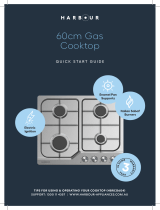
16
Gs Connection
WARNING: This pplince must be instlled
nd connected in ccordnce with instlltion
regultions in force in the country in which the
pplince is to be used.
This pplince is supplied to run on LPG nd
nturl gs. Conversion for use on LPG nd
nturl gses must only be undertken by
qulied person.
INSTALLATION OF APPLIANCE
Note: Wer protective gloves to t the hob.
CAUTION: lf it is necessry to djust or instll
the elbow, it is llowed only torque wrench with
9±1N.m, nd work on the Blck nut of mnifold
insted of on the elbow.
ADJUSTING THE DIRECTION OF ELBOW
After loosening the elbow, djust the elbow
interfce to the required direction s required,
nd keep the hexgonl hed of the elbow
motionless with wrench. Use 9±1N.m torque
wrench to tighten the blck bolt of the gs inlet
pipe ssembly. Ensure tht the torque of the
wrench is within the required rnge to prevent
elbow brekge or dmge cused by excessive
force. After the instlltion is tightened, check
whether the prts re in good condition nd test
the ir tightness to ensure the tightness of the
instlltion. The instller is responsible for the
results of the process.
WARNING: Dnger of leks!
If ny connection is hndled, check the sel.
The mnufcturer is not lible for ny connection
leking, fter being hndled.
OPERATION ON N.G./S.N.G
This appliance is supplied for use with Natural
Gas. However, it can be converted for use with
LPG. Refer to LPG Conversion on page 19.
SUPPLY PIPE SIZING
The total hourly gas consumption for the
appliance is shown on the data label. The required
supply pressure (i.e. at inlet to appliance regulator)
for each gas type is shown on the data label, and
given in Table 3 (page 18). Use this information
in conjunction with the length of run, number
of elbows, tees and bends, the available service
pressure and the supply requirements of other
installed appliances to determine a suitable
pipe size.
For assistance in this matter refer to the
appropriate section of AS/NZS 5601.1 or
AS/NZS 5601.2.
An AGA certied class B or D exible connection
may be used to connect the cooktop in
accordance with AS/NZS 5601.1, in particular
section 5.9 and clause 6.10.1.8, or AS/NZS 5601.2,
in particular section 2.11.
Where a hose assembly is used and the cooktop
is in the installed position, the hose assembly shall
be suitable for connection to a xed consumer
piping outlet located at a point 800 – 850mm
above the oor and in the region outside the width
of the appliance to a distance of 250mm. The
point of connection to consumer piping must be
accessible with appliance installed.
ELBOW POSITIONING
It is possible to reposition the elbow if required
by loosening the locking nut and elbow by using
two spanners. Re-tighten the entire assembly after
the elbow has been repositioned. When tting
elbow to appliance, ensure that the sealing washer
is tted.
Note to Installer: Assembly of elbow to manifold
at rear of unit requires two spanners to secure
locking nut and ensure leak free connection.
For this reason the elbow is best secured onto
cooktop manifold before installing unit into
benchtop.
16
Installing the appliance
Remove the pan supports, the burner lid and flame spreader and carefully turn the appliance upside
down and place it on a cushioned mat.
Take care that the Ignition devices and flame supervision devices are not damaged in this operation.
Apply the sponge provided around the edge of the appliance.
Do not leave a gap in the sealing agent or overlap the thickness.
(A) SEALING STRIP
(C) SCREW (B) BRACKET
2.
1.
3.
2.
3.
Do not use a silicon sealant to seal the
appliance against the aperture.
This will make it difficult to remove the
appliance from the aperture in future,
particularly if it needs to be serviced.
Place the bracket (B) over the holes that match the
size of the screws.There are one set of screw holes in
each corner of the hob (H).Slightly tighten a screw (C)
through the bracket (B) so that the bracket is attached
to the hob, but so that you can still adjust the position.
Carefully turn the hob back over and then gently lower
it into the aperture hole that you have cut out.
On the underneath of the hob, adjust the brackets into
a position that is suitable for your worktop.
Then fully tighten the screws (C) to secure the hob into
position.
Gas Connection
This appliance must be installed and connected in accordance with installation
regulations in force in the country in which the appliance is to be used.
This appliance is supplied to run on LPG and natural gas. Conversion for use on LPG
and natural gases must only be undertaken by a qualified person.
Installation of appliance
Note: Wear protective gloves to
fit the hob.
Caution!
Black nut of
manifold
Elbow
Torque:
9±1N.m
lf necessary to adjust or
install the elbow, it is allowed
only torque wrench with
9±1N.m, and work on the
Black nut of manifold instead
of on the elbow.
9.0N.m




















